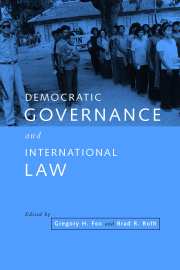Book contents
- Frontmatter
- Contents
- List of contributors
- List of acknowledgments
- Introduction: the spread of liberal democracy and its implications for international law
- PART I THE NORMATIVE FOUNDATIONS OF A RIGHT TO POLITICAL PARTICIPATION
- PART II DEMOCRACY AND INTER-STATE RELATIONS
- 4 Democratic legitimacy and the recognition of States and governments
- 5 Constitutionalism and democratic government in the inter-American system
- 6 Government networks: the heart of the liberal democratic order
- PART III DEMOCRACY AND THE USE OF FORCE
- PART IV DEMOCRATIZATION AND CONFLICTING IMPERATIVES
- PART V CRITICAL APPROACHES
- Index
4 - Democratic legitimacy and the recognition of States and governments
Published online by Cambridge University Press: 04 May 2010
- Frontmatter
- Contents
- List of contributors
- List of acknowledgments
- Introduction: the spread of liberal democracy and its implications for international law
- PART I THE NORMATIVE FOUNDATIONS OF A RIGHT TO POLITICAL PARTICIPATION
- PART II DEMOCRACY AND INTER-STATE RELATIONS
- 4 Democratic legitimacy and the recognition of States and governments
- 5 Constitutionalism and democratic government in the inter-American system
- 6 Government networks: the heart of the liberal democratic order
- PART III DEMOCRACY AND THE USE OF FORCE
- PART IV DEMOCRATIZATION AND CONFLICTING IMPERATIVES
- PART V CRITICAL APPROACHES
- Index
Summary
In a seminal 1992 article, Thomas Franck postulated the emergence in international law of a right to democratic governance. Franck argued that, increasingly, the acceptance of a government by other States turns on whether the government governs with the consent of its people.
In supporting this notion, Franck pointed to events such as the 1991 effort by Haitian military and police authorities to overthrow the elected President of Haiti, Jean-Bertrand Aristide. Although those authorities exercised complete control over Haiti, the international community condemned the coup leaders, refused to engage in normal diplomatic relations with them or to seat their representatives at international organizations, and instead continued to recognize the exiled President Aristide as representing the legitimate government of Haiti. Severe economic and ultimately military sanctions were imposed on Haiti, and finally, in 1994, the coup leaders were forced to relinquish power. President Aristide then returned to Haiti to complete his term as President.
The reaction to the Haitian crisis may be important evidence that the international community finds relevant, at least in certain situations, that governing authorities have not been democratically elected. But does this incident, and other examples of State practice, support the proposition set forth by Franck?
The first and most fundamental element in legal relations between States is whether a particular political community is “recognized” as a State, for only in this way can that community engage as a State in legal relations with other States.
- Type
- Chapter
- Information
- Democratic Governance and International Law , pp. 123 - 154Publisher: Cambridge University PressPrint publication year: 2000
- 17
- Cited by



